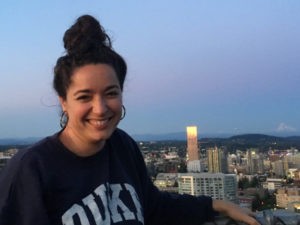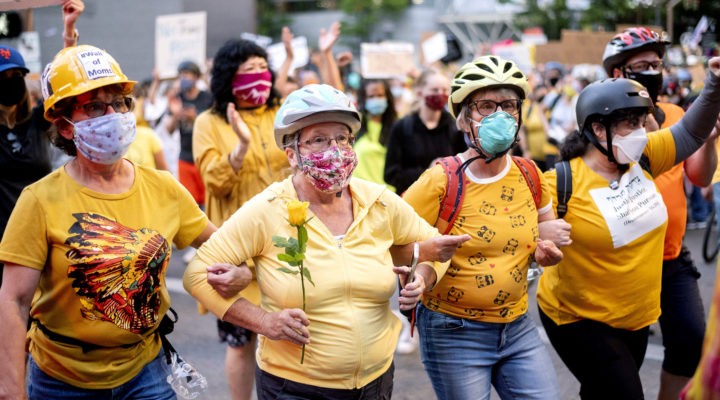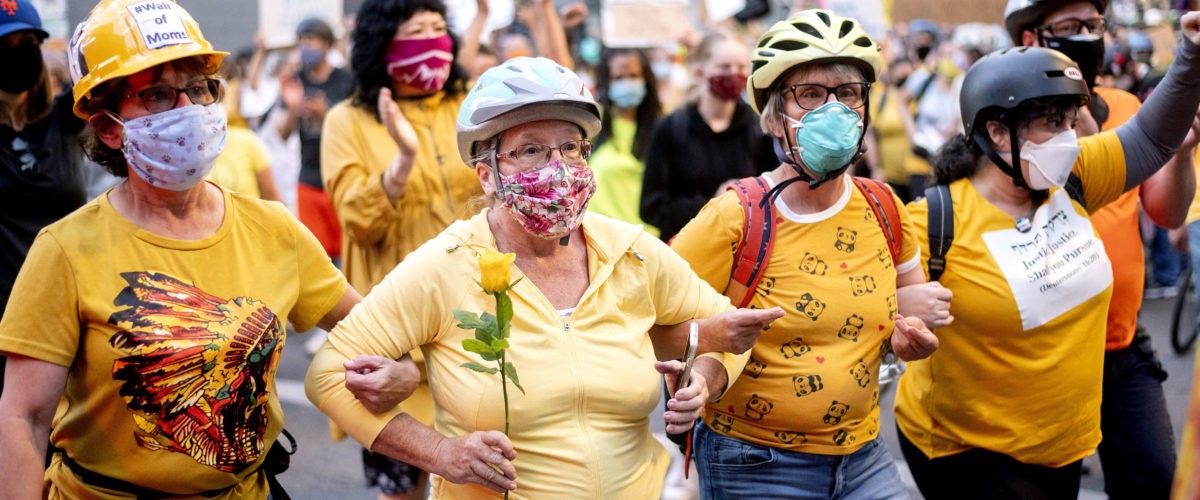A few years ago, I was driving home through downtown Portland, Ore., on a Sunday afternoon when I got stuck in a protest. Antifa was on one side of the street. The right-wing group Patriot Prayer was on the other. And I was in my car in between, unable to move forward, unable to move backward. As we finally were taking the left-hand turn that would get us out of the protest, a line of heavily geared law enforcement swept by.
I have had few moments of feeling in bodily danger, but that Sunday was one of them. There was nothing I could do to protect myself. If anyone in those three groups had shot at each other, I was there in the middle, a sitting duck.
 For the past 50 days, Portland has been in the midst of another round of protests — a participation in our national protests about police brutality toward Black people.
For the past 50 days, Portland has been in the midst of another round of protests — a participation in our national protests about police brutality toward Black people.
For a while, everywhere you looked in Portland there was a protest.
There were the families standing out on street corners waving their signs and getting affirmative honks. There were the massive marches that left from Revolution Hall. There were the antifa kids hunched over the picnic tables at Laurelhurst Park, seriously planning that day’s protest during my evening walk. There was the counter-protest at our local roundabout by what looked to be Catholic schoolboys. They held a sign that said, “Honk if you love God.” I honked before I read the rest of their signs. Lesson learned: Read before you honk.
While most of those protests have ended, one protest has continued: the late-night protests at the Justice Center. This is the protest you’ve seen on TV.
I am one of the pastors at Portland Mennonite Church, and our church — like many of your churches — has been actively engaged in anti-racism work. We have marched together in our recent daytime protests. We have joined our local chapter of the NAACP and are supporting them financially. We are currently calling our senators to encourage them to pass legislation to stop the funneling of militarized weapons to the police. For years, we have had Sunday school classes and preached sermons and fostered ecumenical relationships — all as a witness to the God we know in Jesus, a God of justice and peace.
But as an Anabaptist pastor who believes the way of Jesus is the way of nonviolence, I’ve also struggled to know how to respond to the protests down at the Justice Center.
“The protesters break windows, but the police are breaking bodies.”
How do I talk about the police violence compared to the protesters’ when there is an enormous imbalance of power? The police have guns, munitions and tear gas. The protesters have laser lights, water bottles and the occasional naked woman (nudity is legal in Portland if it is an act of protest). The protesters break windows, but the police are breaking bodies. The protesters light fires, but they’re also being taken away by officers with no identification in unmarked cars.
What do I think about the destruction of property? Obviously as a follower of Jesus, I value people over property. But it’s also scary. It feels out of control. And it does come at a cost.
In the midst of all my questions, however, there is one thing I am certain of: Portland is being used. The questions I have are big, but the scope of the protest is small. All of the scenes looping on TV and Twitter are more or less contained within one city block. The graffiti, the fences, the scenes of protesters and police facing off — all of that lives on the single block between the Justice Center and Chapman Square. Last weekend I drove a mere two blocks from the protest at 10 p.m., and it was calm as calm can be. Two blocks away.
So why is there all of this attention? I am convinced it is another effort to polarize. To drive people deeper apart. To depict our beautiful city as out of control for political points.
“I don’t think we need to wait for a perfect protest in order to participate in the work of racial justice.”
As much as I have questions about our Justice Center protests, I don’t think we need to wait for a perfect protest in order to participate in the work of racial justice. I don’t think Jesus would have. Jesus didn’t mind joining forces with imperfect people. After these protests, whenever I think about Simon the Zealot I picture him as a punk antifa kid — angry at systemic injustice of the world, passionate that things change. Simon, the punk zealot that he was, was a part of Jesus’ crew.
According to Jesus, the kingdom of God (which guess what? It’s us!) is like itty bitty grains of leaven. Leaven is mixed in with all the dough. The flour and the water and the leaven are all one thing, jumbled together. And yet the leaven has a unique role. Its role is to cause the dough to rise.
Our calling as Christians isn’t to separate ourselves from imperfect people or imperfect protests. Our calling is to cause them to rise. To lift them. To let the flour and water help us be what we were always meant to be: bread for the world.
With this politicized national and international attention, I’m afraid the bread won’t quite get there. We won’t fully rise to the level we need to in order to make real change. I’m afraid the power moves are sucking the air out of the loaf. I’m afraid a conversation that should be focused on the infinitely precious lives of Black Americans is getting deflated into political set-to. We cannot let that happen.
Two blocks away from the courthouse where the apparently TV-worthy protests are, a new courthouse is being built. I see the new courthouse as a symbol of what we’re mixed up in and what we’re mixed up for. We are in the mix for a new and better justice. We are standing together to help our neighborhoods, our cities and our country to rise.
Britt Carlson serves as pastor of community life at Portland Mennonite Church. She is a graduate of Seattle Pacific University and earned the master of divinity degree at Duke Divinity School. She is a native of Portland.


